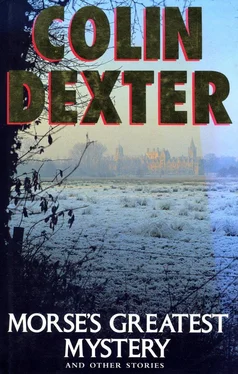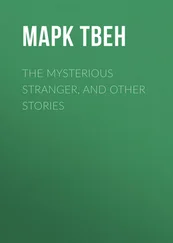1 IAN BRADLEY
2 EMMA SKIPPER
3 VALERIE WARD
4 JIM MORWOOD
5 CHRISTINA COLLINS
6 UNA BROSHOLA
7 ELISSA THORPE
8 RICHARD ELVES
9 MARY ANN COTTON
Morse scanned the list, his attention soon focusing on the last name.
“Odd,” he mumbled.
“Pardon?”
“Mary Ann Cotton. Same name as that of a woman hanged in Durham jail in the 1880s.”
“So?”
“And look at her !” Morse’s finger pointed to number five, Christina Collins. “She got herself murdered up on the canal in Staffordshire somewhere. Surely!”
“I’m not quite with you, Inspector.”
“Do you get phoney names sometimes?”
“Well, you can’t tell, really, can you? I mean, if you say you’re Donald Duck—”
Morse nodded. “You are Donald Duck.”
“You’d perhaps use a nom de plume if you were an established author...”
“But this competition’s only for first-timers, isn’t it?”
“You’ve been reading the small print, Inspector.”
“But how do you know who they are if they’ve won?”
“We don’t sometimes. Not for a start. But every entrant sends an address.”
“I see.”
Morse looked again at the list, and suddenly the blood was running cold in his veins. The clues, or some of them, were beginning to lock together in his mind: the short-story leaflet; the advice of Diogenes Small, that guru of creative writing; the book that young Bayley had borrowed... the translation of Virgil’s Aeneid , in which Dido, the queen of Carthage, had fallen in love with Aeneas and then stabbed herself in her despair... Dido... known also by an alternative name — Elissa!
Morse took out a pencil and lightly made twelve oblique strokes through each letter of ELISSA THORPE, in what seemed to De Lincto a wholly random order; but an order which in Morse’s mind spelled out in sequence the letters of the name SHEILA POSTER.
Morse rose to his feet and looked across at the cabinet. “You’d better let me have story number seven, if you will, sir.”
“Of course. And if I may say so, you’ve made a very good choice, Inspector.”
Only one message was awaiting Morse when he returned to his office at HQ: Dr. Hobson had called to say that Sheila Poster was about twelve weeks pregnant. But Morse paid scant attention to this new information, for there was something he had to do immediately.
He therefore sat back comfortably in the old black-leather armchair.
And read a story.
Yet always it is those fictional addenda which will effect the true alchemy.
(Diogenes Small, Reflections on Inspiration and Creativity )
The story (printed verbatim here) which Morse now began to read was cleanly typed and carefully presented.
I’d seen the advert in the Gazette.
She was going to be a woman who walked silent and unsmiling through any door held open for her; a woman who would speak in a loud voice over the counter at a bank; a woman conscious of her congenital superiority over her fellow beings.
In short she was going to be a North Oxford lady.
And she was — a double-barrelled one.
I was gratified though surprised that my carefully worded application had been considered and I caught the bus in good time.
At 10:30 A.M. to the minute I walked along the flagged path that bisected the weedless front lawn and knocked at the door of The Grange in Squitchey Lane.
A quarter of an hour later, after a last mouthful of some bitter-tasting coffee, I’d landed the job.
How?
I wasn’t sure, not then. But when she asked me if I’d enjoyed the coffee, I said I preferred a cup of instant, and she’d smiled thinly.
“That’s what my husband says.”
I hoped my voice showed an appropriate interest.
“Your husband?”
“He’s abroad. The Americans are picking his brains.”
She stood up.
“Do you know why I’ve offered you the job?”
It was a bit risky but I said it: “No one else applied?”
“I’m not surprised you have a degree. You’re quite bright really.”
“Thank you.”
“You need the money, I suppose?”
I lowered my eyes to the deep Wilton and nodded.
“Goodbye,” she said.
I left her standing momentarily there at the front door — slim, elegantly dressed, and young — well, comparatively young.
And, yes, I ought to admit it, uncommonly attractive.
The tasks allotted to me could only just be squeezed into the nine hours a week I spent at The Grange.
But £36 was £36.
And that was a bonus.
Can you guess what I’m saying? Not yet?
You will.
Two parts of the house I was forbidden to enter: the master bedroom (remember that bedroom!) and the master’s study — the latter by the look of it a large converted bedroom on the upstairs floor whose door was firmly closed.
Firmly locked, as I soon discovered.
There was no such embargo on the mistress’s study — a fairly recent addition at the rear of the house in the form of a semi-conservatory, its shelves, surfaces, and floor all crammed with books and littered with loose papers and typescripts. And dozens of house-plants fighting for a little Lebensraum.
I was invariably fascinated with the place as I carefully (too carefully) watered the plants, replaced the books in alphabetical order, shuffled untidy piles into tidy piles, and carefully (too carefully) hoovered the carpeted floor and dusted around.
I love charging around with a duster. It’s one of the only jobs I do where I can actually see a result.
And I like seeing a result...
There was only one thing wrong with that room.
The cat.
I hate all cats but especially thiscat, which occasionally looked at me in a mysterious knowing aristocratic potentially ferocious manner.
Like his mistress.
A small two-way cat-flap had been cut into the door leading from the conservatory to the rear garden through which the frequently filthy-pawed “Boswell” (huh!) would make his exits and his entrances.
Ah, but bless you, Boswell!
I felt confident that Mrs. Spencer-Gilbey could not have taken up my single reference since from the beginning she called me “Virginia” without the slightest hint of suspicion.
For my part, I called her “ma’am,” to rhyme with “jam.” It was five syllables shorter than any more formal address, and I think the royal connotation was somewhat pleasing to her.
Early on the Wednesday morning of my third week the amateurish tack-tack-tack of the typewriter in the conservatory stopped and my employer came through into the downstairs lounge to inform me she had to go out for two hours.
It was at that point I made my first bold move.
I took a leather-bound volume from the bookshelf beside me and blew a miniature dust-storm along the golden channel at the top of its pages.
“Would you like me to give the books a wipe with a duster?”
For a few seconds I thought I saw in those cold grey eyes of hers something very close to hatred.
“If you can put them all back exactly as you found them.”
“I’ll try, ma’am.”
“Don’t try. Do it!”
It was going to be a big job.
Bookshelves lined three whole sides of the room, and at mid-morning I had a coffee-break in the kitchen.
Outside by the garden shed I saw the steatopygous odd-job man who appeared intermittently — usually when I was leaving — to fix a few things as I supposed.
I held my coffee-cup up to the window and my eyes asked him if he’d care to join me.
His eyes replied yes and I saw he was younger than I had thought.
Читать дальше












